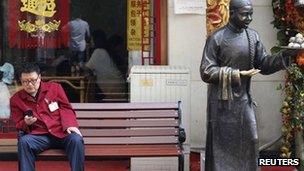Why the yuan's value remains in dispute
- Published
- comments

China needs further reforms, says the IMF
The IMF has downgraded China's growth to below 8% to 7.75% for this year and next, and called for "decisive" reforms. These relate to putting economic growth on a sustainable path (see my earlier post).
Among those reforms are calls for the Chinese government to relax controls of interest rates and the exchange rate.
The IMF again said that the Chinese currency is "moderately" undervalued. As the renminbi (or yuan) has strengthened to about 6.1 to the US dollar, the Chinese response may well be to say again that the yuan is close to equilibrium or at most "slightly" under-valued.
China can point to its trade surplus falling to below 3% of GDP last year as evidence that its currency is no longer giving it a significant competitive advantage. But others will say that it still is a surplus in a weak global recovery, when the world's second-largest economy should be more geared to importing and consuming.
This is an issue that is unlikely to be settled soon. But, rather than being mainly linked to trade, the movement of capital is increasingly important in determining the value of the renminbi. China controls the movement of money across its borders, but its loosening control means that trade is not the only determinant of the exchange rate.
But China doesn't have one interest rate that businesses and households can rely on to make their investment and saving decisions.
So, while we can say that the key interest rate for the UK and euro-area is 0.5%, such a rate doesn't exist for China. Instead, there are benchmark lending and deposit rates. The Chinese central bank has set the lending rate at 6% and the deposit rate at 3%.
There is some latitude for banks to set rates around those benchmarks, but banks are essentially guaranteed a margin, a profit from the rate that they lend at and pay in interest on deposits.
With a predominantly state-owned banking sector, this system supports banks which have been under pressure, including being called upon to finance local government spending. Local banks have taken up the slack where a local bond market doesn't exist, though that is beginning to change.
Without such an interest rate, it is hard to know the cost of borrowing, with some reports that lending rates are in double digits. No wonder money moves into China and pushes up the demand for, and thus the value of, the yuan, even while the trade surplus has fallen.
This is one of the reasons why the IMF has focused on the need to reform the interest rate along with the exchange rate. Significant reforms have been undertaken, but China doesn't yet have one main interest rate.
To get there would require reforms of the financial system, including the banks and the fiscal system. It would then pave the way for greater opening, too, which can help China's ambitions to establish global companies. Ultimately, these reforms would help to stabilise and sustain growth.
Until there is one, the value of the exchange rate is unlikely to be settled. And, we can expect more reports from the IMF along these lines.